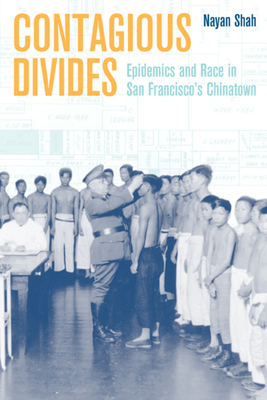Contagious Divides: Epidemics and Race in San Francisco's Chinatown

Contagious Divides: Epidemics and Race in San Francisco's Chinatown
Contagious Divides is an ambitious contribution to our understanding of the troubled history of race in America. Nayan Shah offers new insight into the ways that race was inscribed on the streets, the bodies, and the institutions of San Francisco's Chinatown. Above all, he offers powerful examples of the impact of ideas about disease, sexuality, and place on the rhetoric and practice of racial inequality in modern America.--Thomas J. Sugrue, author of The Origins of the Urban Crisis
Contagious Divides charts the dynamic transformation of representations of Chinese immigrants from medical menace in the nineteenth century to model citizen in the mid-twentieth century. Examining the cultural politics of public health and Chinese immigration in San Francisco, this book looks at the history of racial formation in the U.S. by focusing on the development of public health bureaucracies.
Nayan Shah notes how the production of Chinese difference and white, heterosexual norms in public health policy affected social lives, politics, and cultural expression. Public health authorities depicted Chinese immigrants as filthy and diseased, as the carriers of such incurable afflictions as smallpox, syphilis, and bubonic plague. This resulted in the vociferous enforcement of sanitary regulations on the Chinese community. But the authorities did more than demon-ize the Chinese; they also marshaled civic resources that promoted sewer construction, vaccination programs, and public health management.
Shah shows how Chinese Americans responded to health regulations and allegations with persuasive political speeches, lawsuits, boycotts, violent protests, and poems. Chinese
PRP: 220.32 Lei
Acesta este Prețul Recomandat de Producător. Prețul de vânzare al produsului este afișat mai jos.
198.29Lei
198.29Lei
220.32 LeiLivrare in 2-4 saptamani
Descrierea produsului
Contagious Divides is an ambitious contribution to our understanding of the troubled history of race in America. Nayan Shah offers new insight into the ways that race was inscribed on the streets, the bodies, and the institutions of San Francisco's Chinatown. Above all, he offers powerful examples of the impact of ideas about disease, sexuality, and place on the rhetoric and practice of racial inequality in modern America.--Thomas J. Sugrue, author of The Origins of the Urban Crisis
Contagious Divides charts the dynamic transformation of representations of Chinese immigrants from medical menace in the nineteenth century to model citizen in the mid-twentieth century. Examining the cultural politics of public health and Chinese immigration in San Francisco, this book looks at the history of racial formation in the U.S. by focusing on the development of public health bureaucracies.
Nayan Shah notes how the production of Chinese difference and white, heterosexual norms in public health policy affected social lives, politics, and cultural expression. Public health authorities depicted Chinese immigrants as filthy and diseased, as the carriers of such incurable afflictions as smallpox, syphilis, and bubonic plague. This resulted in the vociferous enforcement of sanitary regulations on the Chinese community. But the authorities did more than demon-ize the Chinese; they also marshaled civic resources that promoted sewer construction, vaccination programs, and public health management.
Shah shows how Chinese Americans responded to health regulations and allegations with persuasive political speeches, lawsuits, boycotts, violent protests, and poems. Chinese
Detaliile produsului











